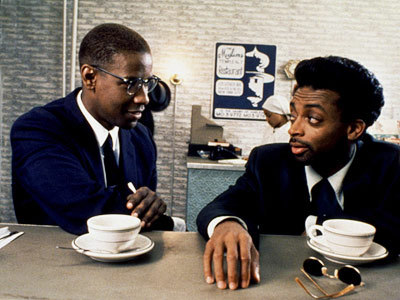Playing a real-life, famous, historical figure is always a daunting task for an actor. (Almost everybody that sees the movie will already have some preconceived notion and maybe knowledge of how the real-life person behaved and how they should be acted.) A biographical film, or bio-pics, puts the actor out on the line more than any other type of movie, because their acting will be immediately noticed. There have been a lot of celebrated performances, over the years, of actors playing real-life people and, usually, if their performance is great it results in Oscar recognition. Some of my personal favorite performances of actors playing real-life figures are Ben Kingsley as Gandhi, Anthony Hopkins as President Richard Nixon, Leonardo DiCaprio as Howard Hughes, Phillip Seymour Hoffman as Truman Capote and, of course, Denzel Washington as Malcolm X.
 |
| Real Malcolm X (left) Denzel Washington-Malcolm X (right) |
 |
| Malcolm X with Shorty (Director Spike Lee) |
For the next several years, Malcolm becomes a prominent member of the Nation of Islam and is friends with Elijah Muhammad (Al Freeman, Jr.), the Nation of Islam’s leader. At this time Malcolm meets Betty X (Angela Bassett) and they get married and start a family. Malcolm and Elijah begin to have some disagreements; Malcolm doesn’t like the hypocrisy he finds in Elijah. Malcolm X is then suspended for 90 days from the Nation of Islam after he makes some rude statements about the JFK assassination, saying, “the chickens came home to roost.” Eventually, Malcolm X completely withdraws from the Nation of Islam and states that he wishes to speak his own thoughts. He starts his own Muslim Mosque and takes on a pilgrimage to Mecca, in which every Muslim man is obligated to do in their lifetime. By the time he returns to the United States he is a changed man again with far more moderate political views but still wants to fight racism. He also agrees to work with other Civil Rights leader like Martin Luther King Jr. to help achieve this. Previously, Malcolm was someone who criticized King’s nonviolence stance against racism. This upsets Elijah Muhammad who begins to try and bring Malcolm X down. Then on February 21, 1965, Malcolm X is gunned down at the Audubon Ballroom in Manhattan by a few black men who were Muhammad loyalists. (link)
Malcolm X lived an extraordinary life and he went through many transitions in his life. The man who was cast to help try and bring this extraordinary man to life was Denzel Washington. An interesting thing to note is that Denzel Washington had already played Malcolm X prior to when he was offered the film role. He played Malcolm X in the early 1980s in a play called, When The Chickens Come Home to Roost. His portrayal of Malcolm in that play was so inspiring and real, that friends of Malcolm X’s widow phoned her and said that you should see this kid playing your dead-husband. Washington said that he always knew in the back of his mind that, “When I did that play I said to myself, I'm going to do this movie one day. I know it.” When Washington was offered the role in Spike Lee’s epic film, he was well aware of the incredible challenge he’d set himself up for. He wanted so much to give a great performance as Malcolm X he devoted an entire year to researching him. Director Spike Lee commented saying, “Every day, Malcolm X just grows in stature. I mean, that performance... Denzel, Mr. Washington, stopped working on other stuff for a year before, to prepare for that film.” (link)
Denzel Washington’s extreme preparation process for Malcolm X was not unusual for him, in the sense that he always thoroughly researched his parts, but even he admits that his research went to the point of obsession for his role in this movie. He commented on that saying, “Everything I have done as an actor has been in preparation for this…I was doing so much work, I just sort of blended into the man as best I could, that was my desire. I had studied so much, I knew even what type of glasses he was wearing on a particular day.”(link)
 Washington’s thorough preparation process paid off big-time in the end, as he gave one of the finest performances ever of a real-life figure. He received a best actor Oscar nomination for his role, but he unfairly lost out to Al Pacino for Scent of a Woman. The movie Malcolm X was based on An Autobiography of Malcolm X, which is known as one of the most insightful and greatest autobiographies ever to be written. Malcolm X's autobiography helped shed some light on who he really was as a man, but it became fully apparent to people what a complex person he was when people saw the embodiment of him by Denzel Washington.
Washington’s thorough preparation process paid off big-time in the end, as he gave one of the finest performances ever of a real-life figure. He received a best actor Oscar nomination for his role, but he unfairly lost out to Al Pacino for Scent of a Woman. The movie Malcolm X was based on An Autobiography of Malcolm X, which is known as one of the most insightful and greatest autobiographies ever to be written. Malcolm X's autobiography helped shed some light on who he really was as a man, but it became fully apparent to people what a complex person he was when people saw the embodiment of him by Denzel Washington. 

I'm wondering what effect this role had on Denzel's own faith as a devout Christian
ReplyDelete